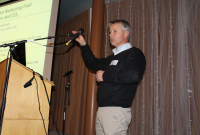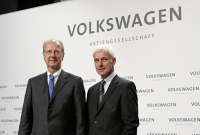Canadian government says Volkwagen unlikely to face maximum penalty for cheating

Dundas, Ontario resident Jim Mackey bought a used 2011 Volkswagen “clean diesel” Jetta in 2012. He said the mileage was amazing, and that he and his wife, a former kindergarten teacher, were happy to have what they thought was an environmentally-friendly car to last them through their retirement.
“My wife and I just both retired. Our ambition here was to have a car that would last quite a while and give good mileage and be doing the right thing by the environment,” Mackey said.
That was before Volkswagen was caught equipping their TDI vehicles with defeat devices that doctored the results of emissions tests. Those vehicles spewed out up to 40-times more toxic emissions than advertised.
Now, the Mackeys are thinking about how they can drive their car as little as possible.
Volkswagen sold around 100,000 TDIs equipped with emissions-fixing software in Canada between 2000 and 2015. Many Canadian motorists say they haven't seen any signs of life from the federal government, apart from a strongly-worded statement from the former Harper administration during the last federal election campaign. Some Canadian consumers have called the federal government “powerless” to punish Volkswagen, especially in contrast to the assertive approach taken by U.S. authorities.
Canada's environmental regulator, Environment and Climate Change Canada, has now confirmed that Volkswagen is unlikely to face the maximum penalty for cheating on its emissions tests.
Canada's approach benefits the accused, environmental lawyer says
Under the Canadian Environmental Protection Act, the maximum fine that a large corporation can face if found in violation of the act is $6 million for each offense. If Volkswagen were charged the maximum penalty for each vehicle equipped with emissions-fixing software sold in Canada - numbering around 100,000 - they’d be stuck with a $600 billion penalty.
But ECCC spokeswoman Maja Stefanovska said in an email that that scenario is unlikely. Although each violation and each day the violation occurs can be considered a different offense, she said they often “globalize charges where multiple occurrences of the same offense are alleged to have been committed by the same person over a period of time.”
“Global charges are charges stipulating a range of dates over which the alleged illegal activity occurred. This practice reduces the time invested in prosecutions because it results in a reasonable number of charges,” Stefanovska said over email.
Joe Castrilli, Counsel with the Canadian Environmental Law Agency, said the government's approach appears to benefit the accused, rather than the public and the environment.
“If it means that you’re charging for less than what they actually committed in terms of violation to the Act and you have evidence for more than you’ve decided to charge for then clearly the company is getting a break, the environment is being harmed and the statute’s not being fully implemented," Castrilli said. "That, as a matter of policy, would not be a good thing.”
At the end of the day, Castrilli said this means both the public and the environment could take a hit "to the extent that the true value of the adverse impact of their conduct is not actually being dealt with by the courts."
He also said he has never seen the term “globalized charges” used in any prosecution involving the CEPA.
In a subsequent email, Stefanovska said the maximum penalty of $6-million is rarely imposed by the courts, "particularly for a first time offender."
There are also civil mechanisms the courts could use to punish Volkswagen for environmental negligence. Court-ordered contributions to the ECCC-administered Environmental Damages Fund are made in cases where persons or corporations destroy or damage the environment.
According to ECCC’s website, payments to this fund are made at the discretion of the court, “in the context of prosecution.”
“Speaking hypothetically, in the case where an importer of non-compliant vehicles is convicted, the prosecutor could recommend that fines/court awards be directed to the EDF – it does not have to be directed from ECCC,” Stefanovska said by email.
“In this case, the prosecutor could recommend that an offender make a payment to the EDF and even suggest ‘conditions’ for how these funds would be used. ECCC can work with the prosecutors to provide further guidance or program details to the sentencing judge, as needed.”
Along with a nationwide class action suit, whose first court date is Oct. 18, and the ECCC’s investigation, Canada’s Competition Bureau — an independent investigatory arm of the Canadian government that oversees business practices — has also confirmed that its own investigation is underway.
U.S. government's “hardcore attitude”
The so-called Volkswagen "dieselgate" scandal was first brought to light last year when the U.S. Environmental Protection Agency unveiled details of a lengthy investigation in collaboration with investigators from the California Air Resources Board.
Earlier this month, the U.S. EPA ordered Volkswagen to fix the nearly 500,000 Volkswagen and Audi diesel cars that the agency said intentionally violate clean air laws by using software that evades EPA emissions standards.
The EPA also called on VW to fix the cars' emissions systems, but said car owners do not need to take any immediate action since the violations do not present a safety hazard and the cars remain legal to drive and sell in the U.S.
Volkswagen has also agreed to pay $16.5-billion in civil litigation fines in the U.S.
Jim Mackey thinks the U.S. government has taken a “hardcore attitude” toward Volkswagen, and is taking the company's fraudulence as seriously as consumers deserve. He said the actions of American regulatory agencies are more reflective of his sentiments toward the company than those taken by the Canadian government.
“As different a place as the U.S. is, I feel like their government and regulatory agencies have taken this seriously, whereas our government is waiting — not even to see what the U.S. is doing — to see what happens in this class action suit,” Mackey said. “To me, it’s not enough.”
Mackey said he has contacted both his MP and MPP about the emissions-fixing scandal, but said he was told not to worry because the matter is before the courts and there’s nothing they can do about it yet.
Volkswagen is also under suit in Germany, where investors have filed complaints related to the emissions scandal valued at $12-billion. According to Bloomberg News, around 1,400 suits have been filed in German court.
The U.S. government has also filed suit in Germany, with their claim valued at 30-million euros.
According to Reuters, Volkswagen CEO Matthias Mueller has set aside $20-billion to deal with the emissions scandal and believes VW can arrive at a settlement with U.S. officials before 2017.
With files from The Canadian Press







Comments
I don't accept the Canadian argument. This is a very serious offence. Volkswagen has has deceived thousands of their Canadian customers as well has harmed the environment. The Canadian government should. Insist thst all cars sold in this country be repaired by Volkswagen. Anything less is not acceptable